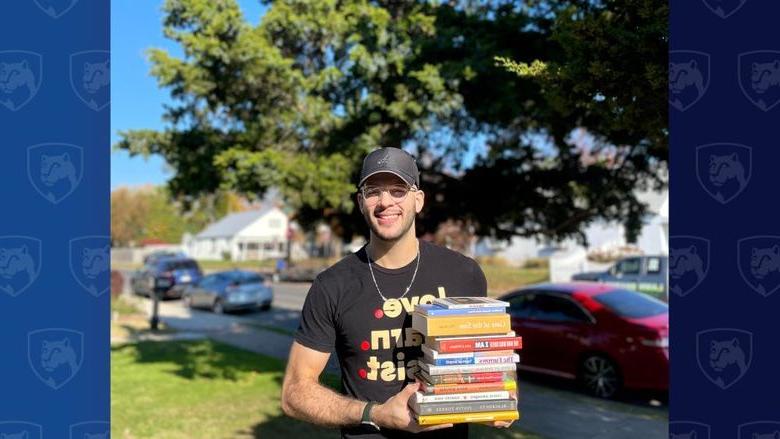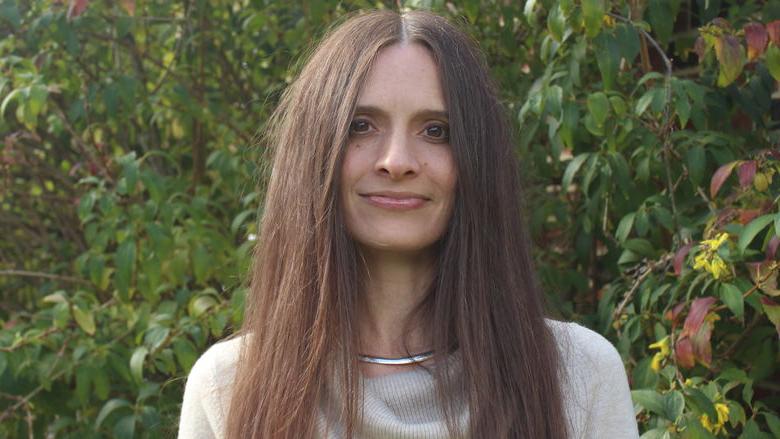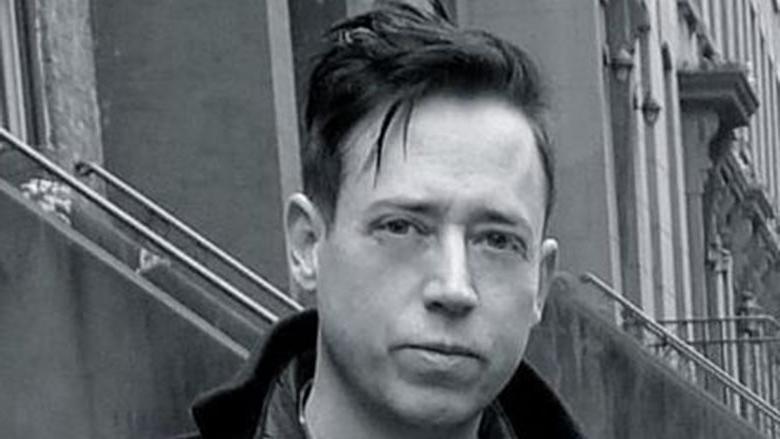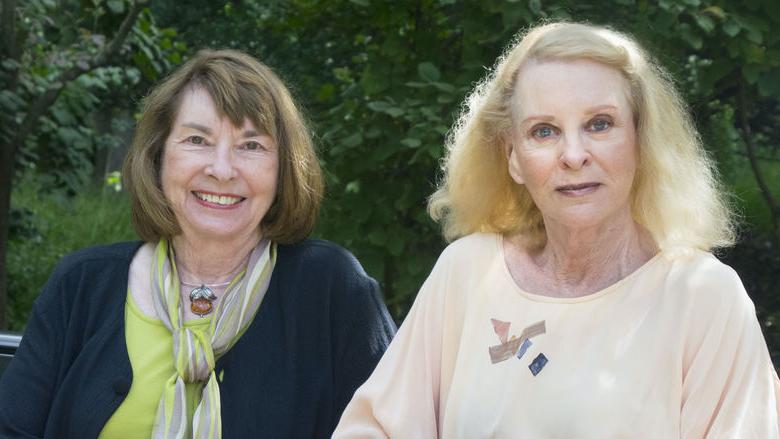Fall 2024 Course Descriptions
English Program and Writing Program
Penn State Abington
English Major (Writing and Literature in Context) Requirements:
- ENGL 200 or 201: ENGL 201
- Pre-1800: ENGL 447
- Post-1800: ENGL 401, ENGL 433, ENGL 434
- Literature, Writing, or Rhetoric: ENGL 050, ENGL 131, ENGL 135H, ENGL 183N, ENGL 201, ENGL 212, ENGL 215, ENGL 224, ENGL 401, ENGL 412, ENGL 415, ENGL 420, ENGL 429, ENGL 433, ENGL 434, ENGL 447, ENGL 487W
- Diversity: ENGL 401, ENGL 433, ENGL 434
- Senior Seminar: ENGL 487W
Writing Minor Courses: ENGL 050, ENGL 212, ENGL 215, ENGL 412, ENGL 415, ENGL 420
English Minor Courses: ENGL 050, ENGL 131, ENGL 135H, ENGL 183N, ENGL 201, ENGL 212, ENGL 215, ENGL 224, ENGL 401, ENGL 412, ENGL 415, ENGL 420, ENGL 429, ENGL 433, ENGL 434, ENGL 447, ENGL 487W
ENGL 050: Introduction to Creative Writing (GA)
Professor Heise
Want to write, but aren’t quite sure how to get started or what to write about? This course is meant to ignite your interests, hone your skills, and introduce you to the foundational elements of poetry, fiction, and creative nonfiction so as to set free your imagination. You will learn to craft images, music, lines, and narrative in the poetry we practice. In fiction, you will learn how to create characters, develop themes, modulate tone and atmosphere, plot a conflict, and manipulate setting. And you will learn to translate and reconstruct personal experience, memory, and research into arguments, scenes, and narratives for creative nonfiction. Along the way, our conversations will turn to the writing and revision process, to why one writes in the first place, and to age-old inexhaustible questions, such as, what are the functions and purposes of poetry, short story, and the essay, what is the difference between truth and fact, and what are the ethics of writing about our own lives and the lives of others. In this course, you’re a writer. And that means you will be writing all the time in an exercise of imagination and perseverance. ENGL 050 welcomes all students interested in creative writing: no previous creative-writing experience is necessary.
ENGL 131: Weird Tales: Literature of Horror and the Supernatural
Professor Archer
Love a good ghost story? Enjoy being terrified? Indulge yourself this fall. This course provides an introduction to a broad range of literary works that deal with horror and the supernatural. Drawing on the etymology of the word “weird,” whose roots lie with the Old English term “Wyrd” (meaning fate), this course also emphasizes readings where fate plays a significant role. From Lovecraft’s Dagon, to Shakespeare’s Macbeth, to Shelley’s Frankenstein, elements of horror and the otherworldly often contribute directly to the lives of the characters we meet and, in many cases, their untimely demise. This course welcomes all critical approaches and is likewise dedicated to exploring prominent themes in Gothic. Assessment includes weekly journal exercises and three essay assignments.
ENGL 135H: Alternative Voices in American Literature
Professor Naydan
ENGL 135 is an Honors survey course that invites students to study alternative voices in American literature, or literature that is written by authors of color and black, indigenous, women, LGBTQ+, immigrant, and other kinds of minoritized or historically marginalized authors who have an interest in critiquing power and privilege in the United States and the globalized world. We will focus on twenty-first-century texts in American historical contexts. These contexts involve, for instance, the War on Terror, #MeToo, Black Lives Matter, and anti-immigrant legislation. Authors will likely include Louise Erdrich, Martín Espada, Mohsin Hamid, Jhumpa Lahiri, Claudia Rankine, Kristen Roupenian, and others. Through readings, discussions, and writing assignments, we’ll familiarize ourselves with aesthetic and rhetorical features of some of the most important novels, short stories, poems, essays, comics, and multi-genre texts of our lifetimes. We’ll also develop a literacy of literature as an inherently political medium that exists in dynamic interplay with and comments on the intersections of race, class, gender, sexuality, faith, nationality, language, and ability as well as the problems and possibilities of social justice.
ENGL 183N The Cold War In Literature, Politics, and History
Professor Pack
At 8:15 a.m. local time in Hiroshima, Japan, the atomic bomb Little Boy was released from the Super Fortress Enola Gay. The bomb detonated 1,900 feet above the city with the resulting blast destroying everything within a one-mile radius of the epicenter. Estimates state that approximately 70% of the buildings in Hiroshima were destroyed. Conservative estimates put the total deaths at about 130,000. As the now iconic mushroom cloud rose over the Japanese landscape, so, too, did the specter of nuclear annihilation rise over the whole of the planet. After the subsequent bombing of Nagasaki just three days later, it became apparent to the entire world that the days of direct combat between world powers may well be over, and that a new age of unprecedented potential destruction was set to begin. It was the dawning of the nuclear era and the start of a new type of paranoia in the mind of every citizen of the world. In our English 183N class we will study primary texts, both fiction and nonfiction, that explore how the Cold War evolved and the effects of Civil Defense on American society, as well as view films that accurately captured the tension and global fear of mutually assured destruction that has dissipated since the fall of the Soviet Union.
English 201: What Is Literature
Professor Naydan
What is literature and how does it work? How do literary texts differ from supposedly non-literary ones? What forms does literature take and why do those forms matter? And how do we go about investigating the wide range of possible meanings that literary texts may have? This course will focus on these among other questions about the nature and features of literature. It will familiarize students with theories and practices that are foundational to studying different kinds of literary texts and contexts. Specifically, we will focus on post-1945 U.S. literature written in different genres, namely a novel, a novella, a memoir, a play, short stories, and poetry. Authors will likely include Alison Bechdel, Don DeLillo, Ling Ma, Claudia Rankine, Philip Roth, and others. We will also read a handful of brief works by critical theorists to gain insight into the different kinds of lenses we might bring to literary works and the world. Through reading and writing about literature and critical theory, we will acquire technical vocabularies used by literature scholars and literary historians. We will also develop an understanding of how literary works operate and how responsible scholars can and do make meaning of them.
ENGL 212: Introduction to Fiction Writing (GA)
Professor Heise
Maya Angelou once remarked, “There is no greater agony than bearing an untold story inside you.” This course is designed to bring that story out. ENGL 212 provides a greenhouse environment in which you can grow and thrive as a writer. To that end, over the course of the semester we will immerse ourselves in writing in ways that will be fun, challenging, and eye-opening. The writing you generate during the semester will form the basis of the workshop – your small community of fellow writers whose work you will learn to read, debate, praise, and critique fairly, informatively, and intelligently. Our workshops will be complemented with discussions focused on the fundamentals of craft, such as character, structure, atmosphere, point of view, figurative language, with the goal of understanding how they mysteriously move us in body, spirit, and mind and with the goal of learning how they can be put together in our own well-crafted writing. Please note that ENGL 212 is a “stacked course,” which means that you can enroll in it at the introductory (ENGL 212) or advanced level (ENGL 412), but whichever level you choose, your goal will be to produce quality short stories or novel excerpts through intensive writing, reading, and workshopping. The assignments will be slightly longer for students in ENGL 412 and the expectations will be higher.
English 215 Introduction to General Nonfiction Writing
Professor Cohen
Share your perspectives on campus and community issues! In this course, you will research, compose, edit, and publish articles for our digital news outlet The Abington Sun.
Students in ENGL 215 will be expected to conduct primary research--conducting interviews and analyzing data, in order to generate ideas for stories of interest to our campus community. Students will pitch their story ideas weekly to an audience of their peers, and decide collectively with editors which stories will move forward.
Over the course of the semester, each student should plan to produce and publish several news articles and feature pieces, improving writing skills in a hands-on process as they work to publish well-researched, impactful articles. Subjects for articles range from politics to current events, sports and arts and culture. Feel free to browse past topics at The Abington Sun.
If you like to write, are interested in learning and writing about current events, and want to see your work published, ENGL 215/415 is the place for you! If you haven’t worked with us before, you should enroll in ENGL 215. If you’re a veteran of our writing staff who wants to further hone your skills, you should register for ENGL 415.
English 224N: Authors and Artists
Professor Cohen
Embedded travel to Scotland!
The art and creative writing programs invite you to participate in Narrative Arts in Scotland, a course featuring collaboration on a multimodal story with colleagues at the University of Dundee in Scotland. Dundee is a UNESCO City of Design. There, you will explore Scotland’s rich history and social concerns by participating in workshops with local artists and authors, visiting museums, and experiencing sites in the Highlands ranging from 20th century Arctic exploration vessels, to Medieval castles, to Neolithic stone circles. Students will collaboratively create and present a multi-modal narrative project.
ENGL 401: Studies in Genre -- Memoirs of Illness (cross-listed with BMH 490: Bioethics and Medical Humanities Capstone Course)
Professor Cohen
This course will build an understanding of memoir as a genre and, using the work of thinkers like Paul Ricoeur, Susan Sontag, and Arthur Frank, begin to explore the ways that memoirs of illness help readers to understand the full scope of the human experience. Since the last few decades of the 20th century, there has been an explosion of memoirs about illness. In the 1990’s, Paul Monette wrote about living with AIDS, and Jean Dominique Bauby famously wrote about experiencing locked-in syndrome. More recently, Susan Gubar has detailed her navigation of systems of cancer care. All of these stories will help students in this course explore deep questions-- how does telling our stories help us confront illness and make meaning of mortality? How does our mortality make meaning of us?
ENGL 412: Advanced Fiction Writing
Professor Heise
Maya Angelou once remarked, “There is no greater agony than bearing an untold story inside you.” This course is designed to bring that story out. ENGL 412 provides a greenhouse environment in which you can grow and thrive as a writer. To that end, over the course of the semester we will immerse ourselves in writing in ways that will be fun, challenging, and eye-opening. The writing you generate during the semester will form the basis of the workshop – your small community of fellow writers whose work you will learn to read, debate, praise, and critique fairly, informatively, and intelligently. Our workshops will be complemented with discussions focused on the fundamentals of craft, such as character, structure, atmosphere, point of view, figurative language, with the goal of understanding how they mysteriously move us in body, spirit, and mind and with the goal of learning how they can be put together in our own well-crafted writing. Please note that ENGL 412 is a “stacked course,” which means that you can enroll in it at the introductory (ENGL 212) or advanced level (ENGL 412), but whichever level you choose, your goal will be to produce quality short stories or novel excerpts through intensive writing, reading, and workshopping. The assignments will be slightly longer for students in ENGL 412 and the expectations will be higher.
English 415: Advanced Nonfiction Writing
Professor Cohen
Share your perspectives on campus and community issues! In this course, you will research, compose, edit, and publish articles for our digital news outlet The Abington Sun.
Students in ENGL 415 will build on the skills they learned in ENGL 215 to conduct primary research--conducting interviews and analyzing data, in order to generate ideas for stories of interest to our campus community. Students will pitch their story ideas weekly to an audience of their peers, and decide collectively with editors which stories will move forward.
Over the course of the semester, each student should plan to produce and publish several news articles and feature pieces, improving writing skills in a hands-on process as they work to publish well-researched, impactful articles. Subjects for articles range from politics to current events, sports and arts and culture. Feel free to browse past topics at The Abington Sun.
If you like to write, are interested in learning and writing about current events, and want to see your work published, ENGL 215/415 is the place for you! If you haven’t worked with us before, you should enroll in ENGL 215. If you’re a veteran of our writing staff who wants to further hone your skills, you should register for ENGL 415.
ENGL 420: Writing for the Web
Professor Esposito
Much of what we read and write today is published online, whether it is for entertainment, information, or work. This course will review various aspects of writing for the web including rhetorical choices, audience analysis, basic design principles, and multimodality. Additional issues very relevant to web reading and writing such as branding, the rise of digital influencers, content strategy, SEO, copyright protections, accessibility and inclusion, knowledge of surveillance and privacy issues, and knowing how to evaluate the credibility of online posts and how to identify fake content will also be discussed.
No prior experience with writing for the web is needed for this course. Students will learn how to create a personal website and write a persuasive, informative web article, an interview planning document, and blog posts including a restaurant review, a detailed event description, an argument using data and graphics, and an instructional document. Assessments will be based on the quality of writing and use of design principles to create web texts and blog posts that are well formatted for easy reading and online navigation.
English 429: New Media and Literature
Professor Cohen
Embedded travel to Scotland!
The art and creative writing programs invite you to participate in Narrative Arts in Scotland, a course featuring collaboration on a multimodal story with colleagues at the University of Dundee in Scotland. Dundee is a UNESCO City of Design. There, you will explore Scotland’s rich history and social concerns by participating in workshops with local artists and authors, visiting museums, and experiencing sites in the Highlands ranging from 20th century Arctic exploration vessels, to Medieval castles, to Neolithic stone circles. Students will collaboratively create and present a multi-modal narrative project.
English 433: The American Novel Between 1900 and 1945
Professor Miller
The American Novel Between 1900 and 1945 examines “the shock of the new” when modernism in literature and the arts jolted America, and elsewhere, from the Victorian age to the worlds of Hemingway, Fitzgerald, Chopin, Faulkner, Wright, Freud, Einstein, and Picasso, among others. In this course students will read and discuss essential novels in American literature and consider the ways that new subjects of exploration and new forms of expression changed not only what and how people thought and acted but why they had to do so. All this echoes yet today in who we are and want to be as “Americans,” and these novels question anew what it means to be human during turbulent times. We will examine several American novels now considered as modernist masterpieces in order to arrive at some interpretive understandings of these works. The course’s format—a combination of lecture and discussion—is designed to guide students toward critical reading and analytical thinking. We will analyze the structure and content of these novels while placing them as well within their biographical, cultural and literary/historical contexts.
ENGL 433 is stacked with ENGL 487W. Students may not enroll in both courses at the same time.
ENGL 434: Topics in American Lit: Alternative Voices in American Literature.
Professor Naydan
ENGL 434 invites students to study alternative voices in American literature, or literature that is written by authors of color and black, indigenous, women, LGBTQ+, immigrant, and other kinds of minoritized or historically marginalized authors who have an interest in critiquing power and privilege in the United States and the globalized world. We will focus on twenty-first-century texts in American historical contexts. These contexts involve, for instance, the War on Terror, #MeToo, Black Lives Matter, and anti-immigrant legislation. Authors will likely include Louise Erdrich, Martín Espada, Mohsin Hamid, Jhumpa Lahiri, Claudia Rankine, Kristen Roupenian, and others. Through readings, discussions, and writing assignments, we’ll familiarize ourselves with aesthetic and rhetorical features of some of the most important novels, short stories, poems, essays, comics, and multi-genre texts of our lifetimes. We’ll also develop a literacy of literature as an inherently political medium that exists in dynamic interplay with and comments on the intersections of race, class, gender, sexuality, faith, nationality, language, and ability as well as the problems and possibilities of social justice.
ENGL 434 is stacked with ENGL 135H and has limited seats. The English Program Chair must approve any student’s enrollment in this course. Enrollment requests will only be granted for students who need both ENGL 487W and a post-1800 400-level ENGL course to graduate at the end of the Fall 2024 semester.
ENGL 447: The Restoration and Eighteenth Century
Professor Rigilano
The Neoclassical Era (1660–1776) is often characterized as genteel, sedate, and of limited relevance today: lots of wigs, florid letters, and polite dancing. But if you adjust the perspective just a bit, a very different picture emerges. This course reveals just how strange and exciting the literature of Restoration and Eighteenth-Century Britain really is. Writers in this period regularly challenged neoclassical ideals of measure and propriety, and their texts suggest that Enlightenment ideas about nature, sensation, and even the self are far less stable than we might have imagined.
We will begin with Margaret Cavendish’s bizarre philosophical fantasy, The Blazing World (1666), move on to the licentious poetry of the libertine Rochester, study of the puns and plots of William Wycherly’s Country Wife (1675), analyze the blistering satire of Jonathan Swift, survey the macabre cartography of Daniel Defoe’s Journal of the Plague Year (1722), observe the disorienting masquerade of Eliza Haywood’s short prose romance, Fantomina (1725), interpret the comic scenes of the artist William Hogarth, and read two novels, Samuel Richardson’s sentimental masterpiece, Pamela (1740), and Horace Walpole’s gothic creation, The Castle of Otranto (1764). This course will provide opportunities to think creatively, read closely, and write with purpose. Assignments will include critical essays and a final research project.
English 487W - Senior Seminar: The American Novel Between 1900 and 1945
Professor Miller
The American Novel Between 1900 and 1945 examines “the shock of the new” when modernism in literature and the arts jolted America, and elsewhere, from the Victorian age to the worlds of Hemingway, Fitzgerald, Chopin, Faulkner, Wright, Freud, Einstein, and Picasso, among others. In this course students will read and discuss essential novels in American literature and consider the ways that new subjects of exploration and new forms of expression changed not only what and how people thought and acted but why they had to do so. All this echoes yet today in who we are and want to be as “Americans,” and these novels question anew what it means to be human during turbulent times. We will examine several American novels now considered as modernist masterpieces in order to arrive at some interpretive understandings of these works. The course’s format—a combination of lecture and discussion—is designed to guide students toward critical reading and analytical thinking. We will analyze the structure and content of these novels while placing them as well within their biographical, cultural and literary/historical contexts.
ENGL 487W is stacked with ENGL 433. Students may not enroll in both courses at the same time.





